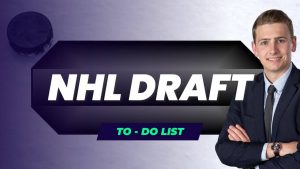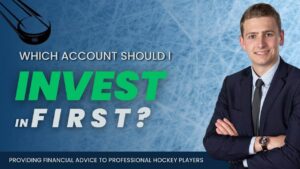[vc_row][vc_column][vc_column_text]
You’ve Recently Been Drafted, Now What?
If you were recently selected in the 2021 entry-level draft, then you’ve accomplished something that very few hockey players can say they did. You’re one step close to living your dream of playing in the NHL, and that is fantastic! Even more, there’s the potential you could start earning really good money very soon.
But unfortunately, it is unlikely that even 50% of drafted players will ever skate in a game, and far less will establish an entire career in the league:
[/vc_column_text][dt_fancy_image image_id=”6576″ width=”630″ height=”314″ css=”.vc_custom_1629148632135{padding-top: 20px !important;padding-bottom: 20px !important;}”][vc_column_text]
The percentages vary based on which round you’re selected, but as you can see, not all draftees make it. And this table represents players who play ONE game. Take it a step further, and only approximately 15% of second-round picks become impact players (and that percentage drops drastically with each round).
What’s The Point?
- What if your hockey career is a lot shorter than you intend?
- What if, due to unforeseen circumstances (injury, poor play, bad luck), the contract offers dry up by the time you turn 25, and you never earn an NHL salary?
If it doesn’t go the way you planned AND you’ve spent all your money, you’ll more than likely look back with some regret.
I’ve had friends and heard multiple stories of players who signed their entry-level deal, spent their entire bonus and salary, and go on to never sign another NHL/AHL deal. They’re left in a precarious position, with no savings to buy them time as they seek an alternative career.
The Good News
Fortunately, even if your experience in the NHL is short-lived, there is still a lot of money that can be made. Typically, your entry-level deal will have a signing bonus attached to it. If you get a maximum ELC, you can receive up to USD 92,500 as a bonus, on top of your salary. The maximum salary is USD 925,000 in the NHL and USD 70,000 in the AHL.
Quick Math: *Even if you’re stuck in the minors, you can be earning USD 162,500 per year. That’s more than enough income over a few years to start saving, investing, and preparing yourself for the possibility you don’t earn huge NHL money.
So, What Should You Do?
I believe you should start considering your finances right away. This doesn’t mean you absolutely need to find a financial advisor, but you shouldn’t leave the financial side of your career on the backburner. Spend some time educating yourself, and seek guidance from family, friends, and teammates. Learn about the stock market, what a registered account is, how compound interest works, etc. More specifically, I encourage you to learn about the NHL Pension or read my Pro Hockey Player’s Guide to Financial Independence (See link below) to learn more about what matters for hockey players.
If you feel there is too much information and you’re putting it off to avoid becoming overwhelmed, I suggest seeking a professional’s advice.
Speak to several advisors and look for someone you feel you can develop a relationship with and whom you can trust. Ask about their fees, what they can do to help you, and what is required on your end of the relationship. Treat this decision no different from how you treated the decision to hire an agent, as this relationship will hopefully last a lifetime and result in a drastic benefit (or deterrent) in the quality of life for you and your family.
Sources
https://hockeyanswered.com/what-percentage-of-nhl-draft-picks-make-it-to-the-nhl/
https://guelphstorm.com/odds-not-great-for-nhl-draft-picks
https://thehockeywriters.com/nhl-entry-level-compensation/
[/vc_column_text][/vc_column][/vc_row]



